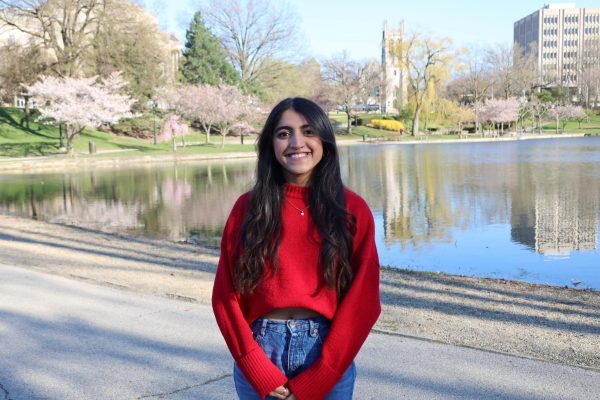On Nov. 12, the Student Presidents’ Roundtable (SPR) hosted its first town hall meeting in Eldred Hall, hoping to educate Case Western Reserve University students about SPR’s mission and discuss each of its umbrella organizations’ upcoming initiatives.
SPR is a student group composed of the highest-ranked members of all the umbrella organizations on campus, including the Class Officer Collective (COC), Interfraternity Congress (IFC), Panhellenic Council (PHC), Residence Hall Association (RHA), Undergraduate Diversity Collaborative (UDC), University Media Board (UMB), University Program Board (UPB) and Undergraduate Student Government (USG). In combining the strength of each of these organizations, SPR aims to start meaningful conversations and bring positive change to campus—often behind the scenes. To better understand what SPR does and the role it plays in our CWRU community, I interviewed several student leaders and received their input on the group’s mission, goals and impacts.
According to fourth-year student and SPR Chair Janvi Ramchandra, “SPR’s mission is to improve student life at CWRU by offering a space for collaboration between the umbrella organizations. SPR also gathers student input about any issues on campus and serves as a link between students, student leaders, and [administration.]” As USG President, one of the biggest umbrella organizations on campus, fourth-year student Basil Yaseen believes SPR is the perfect place for discussing complex issues that require larger conversations. Emphasizing SPR’s role as an open space for discussion, third-year student and UDC Chair Vaishnavi Kumar said that the group also seeks to “amplify diverse student voices from various perspectives and student organizations. Despite the differences in backgrounds and identities, [they] unite as one to advocate for all students.” As such, their initiatives are meant to address campus-wide concerns and enhance the experience of all undergraduates.
To truly make impactful change, SPR is devoted to inclusivity and equal representation, ensuring that all voices are heard and valued. They recognize that achieving inclusivity requires an active effort on the part of the student leaders and their teams, and they are willing to take that extra step. For example, USG hosts Feedback Fridays where students can share their concerns. Members of Greek Life are constantly considering how they can best reach students to ensure their members represent the diversity of CWRU’s campus. Third-year student and RHA President Patrick Wang spoke more on the efforts of SPR as a whole, highlighting that “it’s not enough to just ‘be’ inclusive and accept different viewpoints when they come to you; student leaders must actively seek out and incorporate diverse voices into discussions about topics that directly affect them.”
Making sure student voices are heard starts with a strong communication strategy, and SPR is dedicated to maintaining transparency and open lines of communication with the student body. While much of their communication right now relies on the individual organizations’ campus-wide newsletters and email updates, SPR also has avenues through which students can learn more about their initiatives. They recently created a website where students can view the SPR general body meeting minutes, which are updated weekly. The organization can also be reached through their social media accounts, or through the accounts of individual umbrella organizations. Yaseen reiterated that “students are always free to send our executive team emails, whether it be regarding questions they have about USG or concerns they have on campus, and they can expect us to get back to them in a timely fashion.”
In the past, SPR has contributed to many notable changes on campus. For instance, they were involved in renovating Eldred into a student center and bookable space for organizations to hold meetings and events. Last semester, the group provided free T-shirts to students during Legacy Week. Today, SPR is still working tirelessly to address the new issues the student body faces.
When asked about the most pressing issues facing our campus today, student leaders brought up several topics, from advocacy to housing issues to mental health needs. Ramachandra described the issue of student advocacy on campus and the need to create more channels for student expression. To address this issue, “SPR has created a Student Advocacy Wall on the side of Eldred designed to allow a space for students to expressively paint about different issues.”
A more trivial issue, Wang described laundry as one of the most pressing concerns for students living on campus. He shared that RHA understands student frustrations about the laundry issues in residence halls and stated that they are currently working with the Office of University Housing and the official laundry provider to correct these issues. Additionally, he brought up the lack of accessibility on campus. For this, Wang said they “are currently in the process of a collaboration with the Undergraduate Diversity Collaborative to organize a focus group comprised of people directly affected by these issues to discuss ways to proceed.”
With all this said, why should CWRU students care about SPR?
“Students should care about SPR because all of our organizations have one thing in common: a dedication to representing and improving the experience at CWRU for you,” Wang said. “Whether it may be through providing feedback about issues that you see on campus, participating in our events to gain a better understanding of the university, or attending our weekly meetings to be better informed about the events taking place on campus each week, supporting SPR can directly lead to improving student life on campus for everyone involved.”


